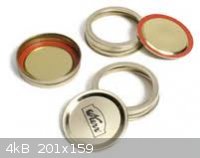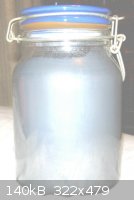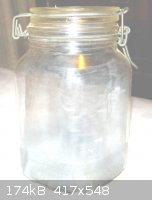Acetic Acid
Hazard to Self
 
Posts: 95
Registered: 14-8-2011
Member Is Offline
Mood: No Mood
|
|
Mason Jars?
This thread was made with regard to the jars you can buy from grocery and hardware stores that come in plastic shrinkwrap casing. I thought about
using these to store some of my chemicals, since they come pretty cheap at 10 dollars for 12 liters of storage, and I am aware of the advantages of
storing chemicals in glass instead of HDPE. However, my main concern is the metal top, which may become corroded and contaminate my samples. Does
anyone else have experience with storing things in these jars?
|
|
|
DDTea
National Hazard
   
Posts: 940
Registered: 25-2-2003
Location: Freedomland
Member Is Offline
Mood: Degenerate
|
|
Yes, the metal top will corrode on mason jars. Do not store anything in them that will react with metals.
"In the end the proud scientist or philosopher who cannot be bothered to make his thought accessible has no choice but to retire to the heights in
which dwell the Great Misunderstood and the Great Ignored, there to rail in Olympic superiority at the folly of mankind." - Reginald Kapp.
|
|
|
Acetic Acid
Hazard to Self
 
Posts: 95
Registered: 14-8-2011
Member Is Offline
Mood: No Mood
|
|
Thanks for your input. Is there any specific info what the top is made of? I'd think iron because it's magnetic. If so, I sadly can't store acid in
them (which was my initial intent :-< and they won't have much use to me. and they won't have much use to me.
|
|
|
DDTea
National Hazard
   
Posts: 940
Registered: 25-2-2003
Location: Freedomland
Member Is Offline
Mood: Degenerate
|
|
I'm pretty sure they aren't made from iron. Some of them are made from zinc though. Even so, zinc won't hold up well against strong acids.
There may be some plastic or even teflon lids available for mason jars. If not for that brand in particular, other companies may make them.
[Edited on 8-29-11 by DDTea]
"In the end the proud scientist or philosopher who cannot be bothered to make his thought accessible has no choice but to retire to the heights in
which dwell the Great Misunderstood and the Great Ignored, there to rail in Olympic superiority at the folly of mankind." - Reginald Kapp.
|
|
|
woelen
Super Administrator
        
Posts: 7977
Registered: 20-8-2005
Location: Netherlands
Member Is Offline
Mood: interested
|
|
I do not store anything in mason jars with caps which can corrode. Even if the chemical inside the jar does not corrode the cap, then an external
source (e.g. humidity, vapors of HCl or HNO3, just himd cold of storage in a garage) can lead to corrosion and each time you open the jar, some crap
crumbles from the cap and may fall into the contents of the jar.
|
|
|
redox
Hazard to Others
  
Posts: 268
Registered: 22-2-2011
Location: The Land of Milk and Honey
Member Is Offline
Mood: Chalcogenetic
|
|
I have been storing benzoic acid (volatile) in a mason jar for about 6 months. It has corroded heavily.
Mason jars are nice for inert powders, though. My anhydrous magnesium sulfate has been in a mason jar for a while, the powder is nice, and it appears
to still be anhydrous.
[Edited on 29-8-2011 by redox]
My quite small but growing Youtube Channel: http://www.youtube.com/user/RealChemLabs
Newest video: Synthesis of Chloroform
The difference between chemists and chemical engineers: Chemists use test tubes, chemical engineers use buckets. |
|
|
Mr. Wizard
International Hazard
    
Posts: 1042
Registered: 30-3-2003
Member Is Offline
Mood: No Mood
|
|
Most "Mason Jars", Kerr , Ball or similar type have a two part lid. The flat part of the lid is meant to be replaced with each canning operation, and
the outer ring is reused after cleaning. The lids are made of steel, even though they appear yellow or bronze colored, and have a rubber type sealing
ring on the flat part.
I wouldn't trust them with anything that can attack steel, but you might get an extra measure of use, and purity if you put a sheet of some inert
plastic over the mouth of the jar, put on a lid, trim for clearance, and then screw down the outer ring to hold it in place. Holding the top lid
stationary while carefully rotating the ring down for compression.
Obviously this isn't the best all around solution to storing things like acids, but it would allow more utility.
The acid vapors that could corrode the outside of the lids could be controlled by putting the whole container inside a plastic bag.
Obviously this is not a safe method for storing corrosives, but might provide a method for some benign chemicals. It might even be a suitable 'second
chance ' outer container for some materials.

|
|
|
Acetic Acid
Hazard to Self
 
Posts: 95
Registered: 14-8-2011
Member Is Offline
Mood: No Mood
|
|
I've been storing inert solids in mason jars that were destined for the recycler and have been thoroughly washed. I have around 250 grams of sodium
acetate in a jar of this description, and I plan to keep manganese dioxide in a mason jar as well.  Thanks! Thanks!
|
|
|
bbartlog
International Hazard
    
Posts: 1139
Registered: 27-8-2009
Location: Unmoored in time
Member Is Offline
Mood: No Mood
|
|
I use mason jars a fair bit. The metal lids won't stand up to much; however, I have done just as Mr Wizard suggests and put two thicknesses of plastic
shopping bag (LDPE) between lid and glass, then tightened. In this configuration, the jar has held a solution of FeCl2 and some excess HCl for a year
without problems (the previous lid was heavily attacked within a couple of weeks). It is also possible to get polypropylene lids for the jars.
Obviously neither LDPE nor polypropylene is especially resistant, but for some purposes they will suffice.
One caution though: mason jars and lids are not designed to contain internal pressure. You can sort of get a decent seal by screwing really tight, so
long as pressure inside is only up to one psi or so, but if you have something with more pressure than that it will likely escape. They do seal well
with internal vacuum (as they're designed to), though.
|
|
|
Arthur Dent
National Hazard
   
Posts: 553
Registered: 22-10-2010
Member Is Offline
Mood: entropic
|
|
Indeed, excellent and inexpensive containers to store large quantities of bulk reagents like pottery grade compounds. A mason jar full of sand is a
quick, instant fire extinguisher. I store highly corrosive stuff (like FeCl3) in mason jars and the replaceable lids (which have an acid-resistant
paint on the underpart) whitstand the FeCl3 very well. I've had a pot outside for over 3 months, and there's not a trace of corrosion on the inner lid
or outer screw-down cap.
I also use the jars as reaction vessels for experiments that are not too exothermic, the wide mouth and tall format being as useful as a berzelius,
plus the threaded cap to store reagents outside for extended periods without dust or grime contamination. The lids/caps are very inexpensive ($3 for a
box of ten) so as soon as a lid starts to degrade, it can be replaced without a fuss.
Finally, I use the proverbial mason jars to store the remains of paint cans. The leftover paint remains intact and useable for a long time because the
jars prevent air from oxidizing and drying out the paint, and no rust crumbles onto the paint if you need to do a touch-up years later...
Make sure to seek the lids that are painted beige, they resist corrosion and humidity very well (I know that vinegar and tomatoes are less acidic than
20 BE HCl but it works!)
Robert
--- Art is making something out of nothing and selling it. - Frank Zappa ---
|
|
|
Mr. Wizard
International Hazard
    
Posts: 1042
Registered: 30-3-2003
Member Is Offline
Mood: No Mood
|
|
I hadn't thought about storing paint in them, but it would work well. I have used the larger 24 oz (710 ml) PET carbonated beverage (soda) containers
to store left over or touch up paint. The paint is easily shaken up, but has to be poured into another container to use.
|
|
|
h2o2guru
Harmless

Posts: 12
Registered: 3-7-2008
Member Is Offline
Mood: No Mood
|
|
Most places that sell the jars also sell plastic screw on lids , regular and wide mouth.
A better lid is made by Tatler with a rubber seal.
I use them for many chemicals ,
the only DOH moment was when I put a small amount of NaOH in one.
Ate right thru the glass.
BIG mess.
Should of known better !
|
|
|
hissingnoise
International Hazard
    
Posts: 3940
Registered: 26-12-2002
Member Is Offline
Mood: Pulverulescent!
|
|
| Quote: |
I use them for many chemicals ,
the only DOH moment was when I put a small amount of NaOH in one.
Ate right thru the glass. |
Right through it?
Wow! How long did that take?
|
|
|
Sedit
International Hazard
    
Posts: 1939
Registered: 23-11-2008
Member Is Offline
Mood: Manic Expressive
|
|
Yeh I find that very hard to believe as I have boiled solutions down to dryness before of KOH and NaOH with only slight etching of the container, I
have also been storing NaOH flakes in small glass jar for over a year now with no visible etching...... im sorry dude but unless you show proof I call
bullshit.
Knowledge is useless to useless people...
"I see a lot of patterns in our behavior as a nation that parallel a lot of other historical processes. The fall of Rome, the fall of Germany — the
fall of the ruling country, the people who think they can do whatever they want without anybody else's consent. I've seen this story
before."~Maynard James Keenan
|
|
|
Acetic Acid
Hazard to Self
 
Posts: 95
Registered: 14-8-2011
Member Is Offline
Mood: No Mood
|
|
NaOH only really etches glass at a noticeable rate at elevated temperatures
|
|
|
h2o2guru
Harmless

Posts: 12
Registered: 3-7-2008
Member Is Offline
Mood: No Mood
|
|
Sigh , OK , it didn't eat thru the glass , it did etch and crack the glass all around the bottom so it fell off.
Mason jar are not made of boro-silicate glass , they are more like window glass.
Stress corrosion can shatter glass and/or plastic.
I once watched a plastic alltem container shatter/explode when ph 12 fluid started to filled it.
|
|
|
White Yeti
National Hazard
   
Posts: 816
Registered: 20-7-2011
Location: Asperger's spectrum
Member Is Offline
Mood: delocalized
|
|
Mason jars are fine for storing chemicals that are not very reactive. I use them all the time for storing ubiquitous bulk chemicals like copper
carbonate, elemental sulphur, powdered carbon, ammonium nitrate etc...
But when it comes to reactive chemicals or chemicals that are extremely pure, I always use glass bottles or vials designed to hold them, not caring
about the price. The reason for that is that some chemicals are expensive and it pays off to have a sturdy, well designed, and expensive container.
[Edited on 9-2-2011 by White Yeti]
|
|
|
MadHatter
International Hazard
    
Posts: 1332
Registered: 9-7-2004
Location: Maine
Member Is Offline
Mood: Enjoying retirement
|
|
Chemical Storage
While not mason jars, I found these in a consignment store several years ago. You can
see how it seals against a brown rubber ring. This one has a metal lid. I have a couple
smaller jars with glass lids and rubber sealing rings. As soon as I can find one, I'll post a photo.
The reason you can't see through the glass is because the inside is coated with the aluminum
powder I milled.
The glass lidded jars are the only type I would even consider storing corrosives in and
even that would make me nervous. I hope I can find more of these jars because I really
like them for compound storage. 

From opening of NCIS New Orleans - It goes a BOOM ! BOOM ! BOOM ! MUHAHAHAHAHAHAHA !
|
|
|
MadHatter
International Hazard
    
Posts: 1332
Registered: 9-7-2004
Location: Maine
Member Is Offline
Mood: Enjoying retirement
|
|
Glass Lid
Found one although the rubber ring is missing. This one also contains aluminum powder.
The lessons I've learned over the years, and the very experienced members here
can tell you, is that it's possible to find what you need or want in venues other than chemistry
suppliers. Hardware stores are great ! Other examples would be Sears, garden shops,
pottery suppliers and even arts & craft stores. This applies to equipment and compounds.

[Edited on 2011/9/3 by MadHatter]
From opening of NCIS New Orleans - It goes a BOOM ! BOOM ! BOOM ! MUHAHAHAHAHAHAHA !
|
|
|
watson.fawkes
International Hazard
    
Posts: 2793
Registered: 16-8-2008
Member Is Offline
Mood: No Mood
|
|
Quote: Originally posted by MadHatter  | | The glass lidded jars are the only type I would even consider storing corrosives in and even that would make me nervous. I hope I can find more of
these jars because I really like them for compound storage. |
What you've got are so-called "European" canning
jars. Google brings up plenty of hits for this. They're really just the old style of canning jar that was used before single-use lids became
prevalent. You can still buy them new, although I don't know of a cheap source. Perhaps more important, you can still get replacement gaskets for
them.
|
|
|